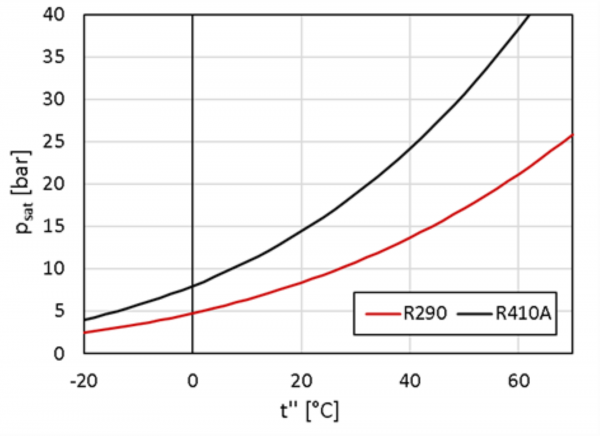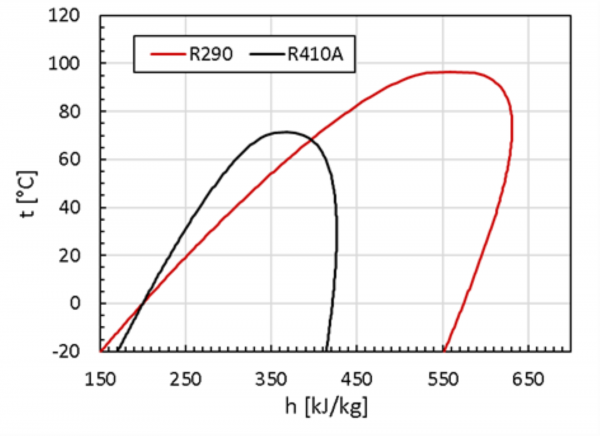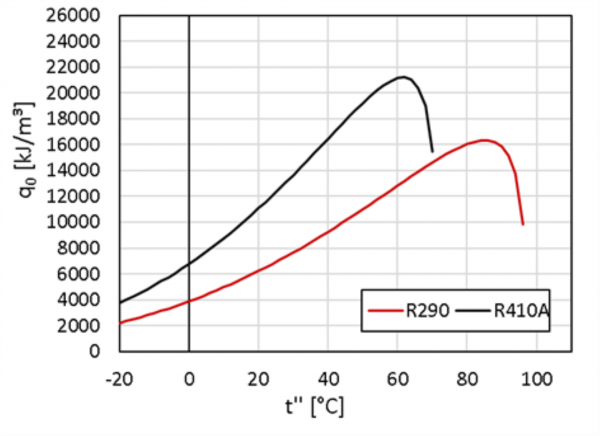IEA HPT Annex 54: Heat pump systems with low GWP refrigerants
Short Description
Due to the quantity reduction of partly fluorinated hydrocarbons required by the F-Gas Regulation (for 2020 by 37% and 2030 by 79% compared to 2015), there will be a shortage of common refrigerants and thus potentially a limitation of the production capacities of heat pumps. The future bans on refrigerants with a GWP above 750 mentioned in a new version of the F-Gas Regulation currently under review would drastically exacerbate this situation. The use of alternative refrigerants with low GWP is often associated with challenges, e.g. flammability.
In this project, via literature research refrigerants with low GWP that show potential for use in heat pumps were identified. By means of system simulations, the necessary adaptations of the heat pump design for a conversion from conventional refrigerants to the (flammable) refrigerant R290, which is often mentioned as a particularly suitable low-GWP refrigerant, were investigated in more detail. A refrigeration circuit with the refrigerant R410A, which is currently the most commonly used refrigerant in heat pumps in Austria, served as a comparison system. The refrigeration circuit was optimized in particular with regard to the reduction of the refrigerant quantity. Subsequently, the two systems were also compared with regard to their life cycle climate balance, which takes into account the emissions during production, installation and decommissioning, the direct emissions from refrigerant leakage and the indirect emissions from system operation.
Due to the international networking with the other countries participating in HPT Annex 54 (South Korea, Japan, Italy, Sweden and the USA), research and market activities could also be taken into account at the international level. Due to a multi-year project extension of the international project, the international input into the national project was lower than in other IEA projects.
A highlight of the national activities are those regarding the outlook until 2030 for the market development of heat pumps with low-GWP refrigerants. The market expectations were discussed with the participating experts in three stakeholder workshops. A very broad range of opinions emerged, which does not allow a specific statement on the 2030 outlook. Further developments depend, for example, on possible bans on conventional refrigerants in the new version of the F-Gas Regulation, which is currently being reviewed, or a possible amendment to the National Refrigeration Regulation, which has been the subject of discussion.
The project results are disseminated via the teaching at the Institute of Thermal Engineering at Graz University of Technology (project partner), via the further training in the handling of flammable refrigerants developed in reference to IEA HPT Annex 54 and via the regular AIT heat pump courses. Result workshops with policy makers and other relevant stakeholders from the heat pump and refrigeration sector were conducted to make the findings accessible to the relevant groups of people.
Project Images
Terms of use: The pictures listed underneath the header “Project Pictures” originate from the projects in the frame of the programmes City of Tomorrow, Building of Tomorrow and the IEA Research Cooperation. They may be used credited for non-commercial purposes under the Creative Commons License Attribution-NonCommercial (CC BY-NC).
Participants
Austria, Italy, Japan, South Korea, Sweden, USA
Contact Address
AIT Austrian Institute of Technogy GmbH
Center for Energy
Ing. Thomas Natiesta, MSc.
Giefinggasse 2
1210 Wien
Tel: +43 (0) 50550-6041
E-Mail: thomas.natiesta@ait.ac.at
Österreichische Energieagentur – Austrian Energy Agency
DI Franz Zach
Mariahilfer Str. 136
1150 Wien
Tel: +43 1 5861524-106
E-Mail: Franz.Zach@energyagency.at
Technische Universität Graz
Institut für Wärmetechnik (IWT)
Ao.Univ.-Prof. Dr. René Rieberer
Inffeldgasse 25/B
8010 Graz
Tel.: 0316 873-7302
E-Mail: Rene.Rieberer@tugraz.at



